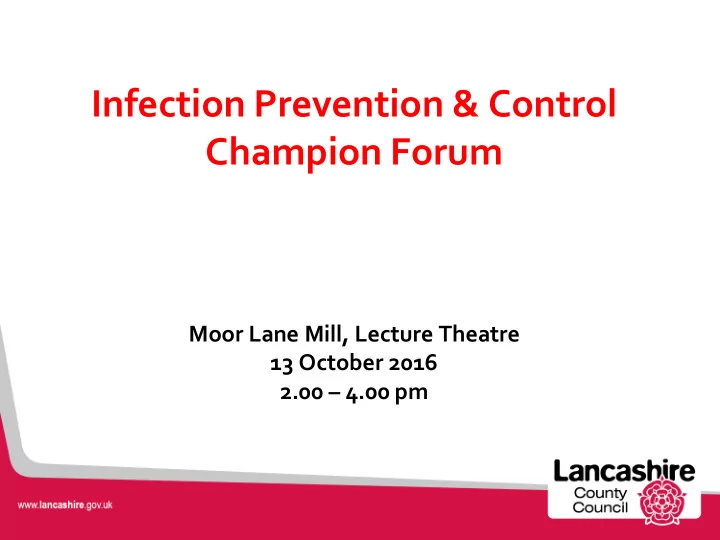

Infection Prevention & Control Champion Forum Moor Lane Mill, Lecture Theatre 13 October 2016 2.00 – 4.00 pm
Housekeeping Fire Exit &Test Alarm Toilets Refreshments
Agenda 1. Which audits need to be carried out? 2. How frequently do they need to be undertaken? 3. Who can carry out audits? 4. Why evidencing audits is important? 5. CQC Audit Visits 6. Your Audits : An opportunity to share models of good practice. 7. Next Meeting Topic
1. Which audits need to be carried out? Environmental IPS Quality Improvement Mattress Tools They will identify the extent of Commodes overall compliance with evidence based criteria required to prevent/reduce the risk of Catheter infection. Hand Hygiene
Process Improvement Tools (PIT) These are tools designed for detailed measurement of all aspects of practice/environment. These tools are very comprehensive and will give a good overall indication of how well the areas are doing and should not need repeating frequently . Question Set: Environment - Housekeeper/Cleaners Room 28 Question Sets Room Function: Cleaners/Domestics Room Infection Prevention and Control Management - General Management Question Set: Linen Management - Linen Management Infection Prevention and Control Management - Staff Health Infection Prevention and Control Management - Staff Training Question Set: Laundry Room - Laundry Room Infection Prevention and Control Management - Guidelines / Policies Question Set: Food Hygiene - Food Storage Question Set: Environment - Reception Environment Question Set: Food Hygiene - Water Cooler/Ice Making Machines Room Function: Lobby/Reception/Entrance Question Set: Food Hygiene - Food Handling/Serving Lounge/Living/Sitting Room Question Set: Sharps Handling and Disposal - Sharps Handling and Disposal Question Set: Environment - Dining Environment Dining Room/Cafe Question Set: Waste Management - Waste Management Question Set: Environment - Resident Bedrooms - General Question Set: Personal Protective Equipment - Personal Protective Equipment Bedroom Question Set: Pets and Pet (as Therapy) Visitors - Pets Question Set: Environment - Bathroom Environment Room Function: Bath/Shower Room Question Set: Resident Equipment - Management of Equipment Question Set: Environment - Toilet Environment Question Set: Resident Equipment - Monitoring & Physiological Equipment Room Function: Toilet Question Set: Resident Equipment - Resuscitation Equipment Question Set: Environment - Clean Utility Environment Room Function: Clean Utility Question Set: Resident Equipment - Respiratory Equipment Question Set: Environment - Dirty Utility Environment Question Set: Resident Equipment - Manual Handling Equipment Room Function: Dirty Utility/Sluice Question Set: Resident Equipment - Miscellaneous Equipment
Rapid Improvement Tool (RIT) These tools are shorter and intended to be used on a frequent basis. It is recommended that if service is persistently poor as measured by the RIT, despite improvement efforts, that a more detailed assessment using the PIT is undertaken. 4 Question Sets Question Set: Care Homes RIT - Infection Prevention and Control Management Question Set: Care Homes RIT - Environment Question Set: Care Homes RIT - Sharps Management Question Set: Care Homes RIT - Personal Protective Equipment
2. How frequently do they need to be undertaken? Weekly Monthly Mattress Catheters Commodes Hand Hygiene 6 Months Annually Environment (RIT) Environment (PIT)
3. Who can carry out audits? Manager Registered Nurse General Management Staff Health Sharps Handling and Disposal Staff Training Monitoring & Physiological Equipment Guidelines / Policies Resident Equipment - Resuscitation Equipment Bedroom Bathroom Linen Management Senior Carer Dining Room/Cafe Lobby/Reception/Entrance Lounge/Living/Sitting Room Laundry Room Domestics Kitchen Staff Cleaners/Domestics Room Clean Utility Food Storage Dirty Utility/Sluice Water Cooler/Ice Making Machines Manual Handling Equipment Food Handling/Serving Waste Management
4. Why evidencing audits is important? Regulations Accountability
Part 2: The Code of Practice The table below is the ‘Code of Practice’ for all providers of healthcare and adult social care on the prevention of infections under The Health and Social Care Act 2008. This sets out the 10 criteria against which a registered provider will be judged on how it complies with the registration requirements related to infection prevention. Not all criteria will apply to every regulated activity. Parts 3 and 4 of this document will help registered providers interpret the criteria and develop their own risk assessments. Compliance criterion What the registered provider will need to demonstrate 1 Systems to manage and monitor the prevention and control of infection. These systems use risk assessments and consider the susceptibility of service users and any risks that their environment and other users may pose to them. 2 Provide and maintain a clean and appropriate environment in managed premises that facilitates the prevention and control of infections. 3 Ensure appropriate antimicrobial use to optimise patient outcomes and to reduce the risk of adverse events and antimicrobial resistance. 4 Provide suitable accurate information on infections to service users, their visitors and any person concerned with providing further support or nursing/ medical care in a timely fashion. 5 Ensure prompt identification of people who have or are at risk of developing an infection so that they receive timely and appropriate treatment to reduce the risk of transmitting infection to other people. 6 Systems to ensure that all care workers (including contractors and volunteers) are aware of and discharge their responsibilities in the process of preventing and controlling infection. 7 Provide or secure adequate isolation facilities. 8 Secure adequate access to laboratory support as appropriate. 9 Have and adhere to policies, designed for the individual’s care and provider organisations that will help to prevent and control infections. 10 Providers have a system in place to manage the occupational health needs and obligations of staff in relation to infection .
5. CQC Audit Visits Five Key Questions CQC inspectors use professional judgement, supported by objective measures and evidence, to assess services against their five key questions: Are they safe? Are they effective? Are they caring? Are they responsive to people’s needs Are they well-led?
https://www.gov.uk/government/uploads/system/uploads/attachment_data/file/449049/Cod e_of_practice_280715_acc.pdf
6. Your Audits : An opportunity to share models of good practice.
7. Next Meeting Topic Transmission of Infection - CDI - MRSA - Scabies - Norovirus
Recommend
More recommend